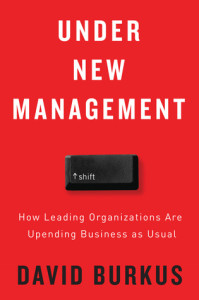Under New Management: How Leading Organizations Are Upending Business as Usual
by David Burkus
© 2016 by David Burkus
Published by Houghton Mifflin Harcourt
ISBN 978-0-544630-970
Reviewed March 2016
This provocative and evocative book by David Burkus will stir the emotion of old-line, command-and-control managers. One look at the table of contents tells how:
• Introduction; Management Needs New Management
• Outlaw Email
• Put Customers Second
• Lose the Standard Vacation Policy
• Pay People to Quit
• Make Salaries Transparent
• Ban Noncompetes
• Ditch Performance Appraisals
• Hire as a Team
• Write the Org Chart in Pencil
• Close Open Offices
• Take Sabbaticals
• Fire the Managers
• Celebrate departures
Let’s take an example. In the chapter about vacation policy, there are compelling reasons – and lots of discussion from well-crafted studies – about how vacation policy should change. When the author says “standard vacation policy” should be lost, his first suggestion is to eliminate a vacation policy altogether. The data cited are not merely anecdotes from some new-age, feel-good, Internet companies. The studies used as reference are compelling and the results have stood the scrutiny of such publications as Harvard Business Review and Inc. There are varying degrees of how vacation policies – remembering that the word “policy” is the same from which we get “police” – can be abandoned. While it may not be practical for some businesses to simply let employees take time off whenever they want, the notion of building trust and commitment has far more value to a business than saving a few dollars from an extra day off.
The other chapters are equally thought-provoking. While many suggestions in the book may not be practical or even possible for middle managers, those in leadership roles would serve their employees – and customers and shareholders – well by implementing these changes, at least to some degree. The days of the organization man are over. The day of the gig, of little job security (for employees and employers), and finding and retaining good people has arrived. When employment rates drop, implementing the policies that Burkus suggests are even more critical to the success of a company.
This book is highly recommended for those who want to do well. The author makes a strong case that doing well will be best served by doing good. Building trust, forging alliances throughout an organization, breaking down organizational barriers, and managers accountable to employees will improve an organization’s performance. This book shows how to implement these “new management” approaches are making lasting, positive change.
Leaders in organizations should read this book – for those who want to influence the leader in your company, buy a copy and leave it anonymously.
Disclosure of Material Connection: This book was received for free from the author but a positive review was not required. The opinions expressed are those of the reviewer. This disclosure is in accordance with the United States Federal Trade Commission’s “Guides Concerning the Use of Endorsements and Testimonials in Advertising” 16 CFR, Part 255.
